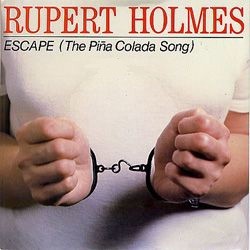
Recently, I listened to Escape (The Pia Colada Song), by Rupert Holmes, for what is likely the thousandth time in my life. It seems a pleasant enough song at first, and I?m not sure I have given it a second thought in 30 years. But listening to it today, in 2016, a few troublesome details emerge that had slipped my notice. To wit, here are the eight most problematic aspects of the song:
- It should not go unremarked that the narrator was actively consulting the personal ads to find a replacement partner while his current partner was actually in physical proximity ? in fact, in the same bed. This reflects a level of temerity somewhat at odds with his later, furtive movements to secure a private rendezvous with a new ?lovely lady.?
- The narrator refers to his current partner as his ?old lady.? It would be unrealistic to assume that this internal narrative did not leak into his external behavior, which in turn may have accelerated the perception that the couple had fallen into ?the same old dull routine.? Or, it could also be the case that his current partner was in fact a senior citizen. But surely, were that true, this moment could have been foreseen and hence avoided. In any case, in modern parlance, referring to one?s female partner as your ?old lady? is fraught with peril and likely to be counterproductive to future romantic inclinations.
- In the narrator?s initial personal ad (a quaint artifact of the pre-Craiglist era, the need for which is now obviated by Tinder), he lists exactly four interests, and two of them are alcohol (Pia Coladas, and Champagne.) That, and the fact that his designated rendezvous point was a bar called O?Malley?s, should have proven to be a red flag for any potential mate that this person might, in fact, be an alcoholic.
- The actual meeting was problematic on several levels. We will get to the fact that the blind date was, in fact, actually the narrator?s current partner in a moment. As if the hints of alcoholism were not enough of a warning sign to a potential mate, the narrator?s initial carefree attitude was soon replaced by an additional list of demands. Though the personal ad only specified two non-alcohol related conditions for a potential relationship, subsequent to the initial meeting the narrator lists no fewer than four additional criteria for romantic entanglement, including a particular method of making love (which by today?s norms would seem audacious on the first date, but this was the 1970’s.)
- One of the additional conditions imposed by the narrator was that his partner not be into yoga. Yoga has many health benefits, and the improved flexibility imparted by yoga might actually come in handy in the dunes on the cape. Don?t knock it ?til you?ve tried it.
- The narrator also desires that his new mate have ?half a brain.? This may or may not be a comment on how he perceives the intellect of his former partner, who by a quirk of fate, has now become his new partner. This criterion may not prove out to be as important as it might initially have seemed in the moment, and I suspect in further negotiations it will come off the table.
- If we discard the ?half a brain? requirement, and make a supposition that he might, in fact, be disabused of his negative perceptions of the benefits of yoga over time, the actual list of his requirements for a new mate really boil down to two: drinking, and outdoor copulation. Surely this is not the bedrock of a lasting relationship, but given the failures of his previous relationship, perhaps at some level he already knows this. In any case, one should not be optimistic that round two with his ?old lady? will go any better than round one did. Also, if he has apparently successfully hidden his love of Pia coladas from his partner for all these years, what else has he hidden, and why? No relationship survives without honesty.
- Finally, it is necessary to deal with the most troubling issue of all ? his former (and current) partner?s response upon seeing that her new blind date was actually (if I may be so bold) her ?old man.? The narrative tells us that her only reaction was a bemused, ?Aww, it?s you!? Let us be clear here ? this woman walks into a bar to meet a blind date and discovers that the man she was going to meet is in fact her (now clearly) philandering current partner. Yes, she too is culpable here, but believing that her first instinct upon the sudden realization that her partner was a cad would be an exclamation of whimsical acceptance (and not umbrage) strains credulity. We have been a little hard on the narrator here; perhaps his partner may in fact not have half a brain.
In any case, all we can do is wish these philandering alcoholics the best of luck as they rekindle their flame. They need all the help they can get.

